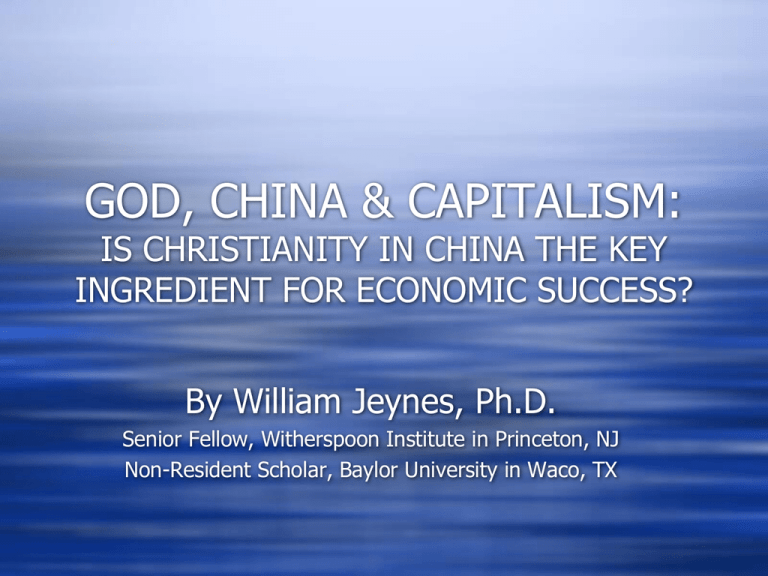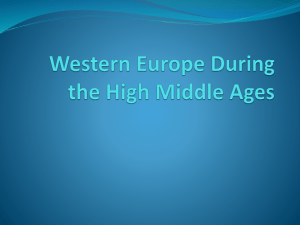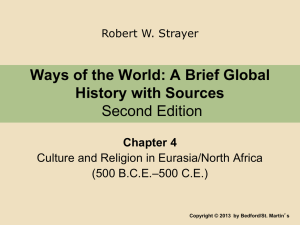A Meta Analysis on the Effects of Various Components of Parental
advertisement

GOD, CHINA & CAPITALISM:
IS CHRISTIANITY IN CHINA THE KEY
INGREDIENT FOR ECONOMIC SUCCESS?
By William Jeynes, Ph.D.
Senior Fellow, Witherspoon Institute in Princeton, NJ
Non-Resident Scholar, Baylor University in Waco, TX
HISTORY OF THE GROWTH OF CHRISTIANITY
IN CHINA
1) Robert Morrison, the first modern day Protestant missionary to
come to China.
2) DID NOT TRULY BECOME OPEN TO CHRISTIANITY UNTIL
AFTER ITS DEFEAT IN THE SINO-JAPANESE WAR OF 1894-95.
Suzanne Pepper (1990, p.10) observes: “Thereafter China
could no longer maintain even the pretense of its ancient
superiority as the center of the East Asian world.”
3) CHINESE BEGIN TO EMBRACE CHRISTIANITY- Western
missions schools blossomed all over the country. American,
British, and Swiss missions schools were doubling in number
every 5-10 years. By 1920 there were 6,301 missions
elementary schools in China.
HISTORY OF THE GROWTH OF CHRISTIANITY
IN CHINA (Part II)
4) In the immediate aftermath of the Chinese Communist
Revolution of 1949, the number of Christians stood at about 1
million.
5) Mao Tse Tung leads a mass persecution of political opponents,
including Christians, and promotes atheism. He especially resists
faith during the Cultural Revolution of 1966-1976.
6) Now it is estimated that the number of Christians in China is
about 100 million and is growing by 6-7 million per year.
WHY HAS CHINA BECOME SO OPEN TO
CHRISTIANITY
1) OFTEN WHEN THERE IS GREAT SUFFERING BY A PEOPLE,
THEY TURN TO CHRISTIANITY. THE CHINESE SUFFERED
MUCH UNDER MAO (e.g., South Korea).
2) FREQUENTLY, WHEN CHRISTIANITY IS REPRESSED FOR A
CONSIDERABLE LENGTH OF TIME, THERE IS A “REACTION IN
THE OPPOSITE DIRECTION,” WHEN THE REPRESSION
SUBSIDES (e.g., in Russia & Eastern Europe).
3) THEY BELIEVE THAT CHRISTIANITY IS RESPONSIBLE FOR
MUCH OF THE HISTORIC SUCCESS OF WESTERN EUROPE &
THE UNITED STATES (e.g., a Harvard Business Conference).
4) IMMORALITY IN CHINA IS OUT OF CONTROL & MANY IN THE
GOVERNMENT BELIEVE THAT CHRISTIANITY MIGHT BE THE
NATION’S BEST HOPE TO ESTABLISH MORALITY.
THE CHINESE GOVERNMENT’S GENERAL
ATTITUDE TOWARD CHRISTIANITY
1) THEY BELIEVE THAT ECONOMIC PROSPERITY CANNOT
CONTINUE IF THE CURRENT LEVELS OF IMMORALITY
PERSIST.
2) THE CHINESE GOVERNMENT IS OFTEN OPEN TO
CHRISTIANITY, BUT WANTS TO CONTROL CHRISTIANITY.
THEY WANT TO LEARN FROM THE LESSONS OF THE FORMER
SOVIET UNION IN THIS REGARD.
a) It is estimated that Christians constituted about 30% of
those who protested in the Tiananmen Square uprising uprising
of 1989.
INDICATIONS THAT THE CHINESE ARE
NERVOUS ABOUT CHRISTIANITY
1) ARRESTS & PERSECUTION OF CHRISTIANS IS STILL
COMMON, e.g., following the Nobel Prize being awarded to Liu
Xiaobo.
2) ABOUT 75 MILLION CHRISTIANS ARE PART OF THE
“UNDERGROUND” CHURCH & 25 MILLION ARE IN THE GOV’T
APPROVED CHURCHES. THE KEY DIFFERENCE: WHETHER
THE GOSPEL CAN BE SHARED WITH THOSE UNDER 18.
3) UNREST AROUND THE WORLD (e.g., recent violence in the
Middle East) SIGNIFICANTLY AFFECTS THE ATTITUDE OF THE
GOV’T DAY BY DAY.
4) THERE IS A CONSIDERABLE POWER STRUGGLE BETWEEN
GOV’T COMMUNISTS & THOSE WHO ARE EITHER CHRISTIANS
OR OPEN TO CHRISTIANITY.
INDICATIONS THAT THE CHINESE
GOVERNMENT IS OPEN TO CHRISTIANITY
1) THE CHINESE GOV’T IS SPENDING HUNDREDS OF MILLIONS
OF DOLLARS TO BUILD CHURCHES & SEMINARIES
2) THE GOV’T HAS SET A GOAL FOR THE (MOSTLY PRIVATE)
FOUNDING OF THOUSANDS OF CHURCHES & 200+
SEMINARIES OVER THE NEXT TWO DECADES.
3) THE GOV’T IS SHOWING OPENNESS TO THE TEACHING OF
THE BIBLE & BIBLE-BASED CHARACTER EDUCATION IN THE
PUBLIC SCHOOLS.
4) IN 2002 JIANG ZEMIN, THE PRIMARY LEADER OF CHINA
FROM 1989-2002, WAS ASKED WHAT HE WANTED HIS
LEGACY TO BE. MACCULLOCH (P. 1007) NOTES THAT ZEMIN
REPLIED THAT HE WOULD “PROPOSE CHRISTIANITY AS
CHINA’S OFFICIAL RELIGION.”
KEY QUESTION: WHY DO
MANY PEOPLE THINK THAT
CHRISTIANITY IS
ASSOCIATED WITH
ECONOMIC PROSPERITY?
THOSE WHO WOULD ASSERT THERE IS A
RELATIONSHIP BETWEEN CHRISTIANITY & ECONOMIC
PROSPERITY
1)
2)
3)
4)
5)
MAX WEBER- Wrote the book, The Protestant Ethic
& the Spirit of Capitalism (1905)
Has been expanded by some researchers to also
apply to Catholicism (Gerhards, 1996)
Barro & McCleary in American Sociological Review
(2003): “Religion is good for the economy.”
DANIEL LAPIN, America’s Real War (1999).
Many Chinese leaders understand the link between
the morality that accompanies Christianity &
economic prosperity.
THE OBSERVATIONS OF MAX WEBER &
THOSE THAT SUPPORT HIS VIEWS
1) Nations with the highest percentage of Christians begin to
dominate around 1050 or 1100 A.D.
2) Lapin, an Orthodox Jewish individual, notes that 90% of the
scientific discoveries over the last 1,000 years were in nations in
which Christianity was the primary religion
3) Protestant Christianity becomes economically & culturally
dominant beginning just after Luther’s 95 Theses (1517).
4) In Weber’s view, Calvinistic Protestantism represents the type
most conducive to economic prosperity and is practiced most in
Great Britain and the United States after 1600, which in his view
helps explain their rise to economic dominance.
5) The Peak of The United States’ Power (1956-1960)- At that time,
Although The United States had only 5% of the world’s
population, it produced 56% of the World’s Goods & Services
(GDP). Church attendance was at a peak of 69% per week.
QUALITIES INHERENT IN CHRISTIAN
PRACTICES THAT PRODUCED A WORK ETHIC &
PROSPERITY (Weber)
1) A Sense of Calling- Directed by divine reason and
more determined and passionate than others. A
number believe there is a strong relationship
between a sense of calling & the work ethic.
a) These people often have an “ascetic spirit,” which
often comes with a sense of purpose (God’s).
2) Honesty- Weber argued that this was necessary for
trust to exist in society and trust was essential to
encourage economic transactions.
a) Calvin/Weber- Most likely to emerge in societies
that discourage materialism.
QUALITIES INHERENT IN CHRISTIAN
PRACTICES THAT PRODUCED ECONOMIC
PROSPERITY (Weber) {Part II}
3) Love And Encouraging People To Be Their Best- The
essence of virtue is ”selfless benevolence” (Jonathan
Edwards & Lyman Beecher). Concern for raising the
living standards of one’s neighbors.
4) Work Ethic- Weber believed the Bible’s warnings
against idolatry and materialism helps. Weber
believed that one of the key prerequisites for
sustained economic prosperity was an absence of
materialism. Because, in his (and the Bible’s) view,
materialism dilutes one’s focus on the call that
creates the personal intensity that ultimately
produces prosperity.
WHY WEBER BELIEVED THAT OTHER MAJOR
RELIGIONS WERE NOT ASSOCIATED WITH
ECONOMIC PROSPERITY
Martin Riesebrodt (2005, p. 25): “Having
studied the civilizations of India and
China
for several years, Weber had a much
better understanding of what he regarded
as the basic differences between these
civilizations and the West.”
WHY WEBER BELIEVED THAT OTHER MAJOR
RELIGIONS WERE NOT ASSOCIATED WITH
ECONOMIC PROSPERITY: HINDUISM
HINDUISM- 1) Hindus are born & not made. In its very essence,
there is a large degree of passivity.
2) Hinduism’s caste system is not conducive to instilling in people a
work ethic that is grounded in a hope in the future and that
better days can lie ahead in which one rises above his or her
present state to a higher level (Anderson, 1957).
3) Hinduism is more of a judgmental religion with its belief in “bad
karma” and reincarnation.
4) There is an increased openness to Christianity in India,
especially because of #3 (above).
WHY WEBER BELIEVED THAT OTHER MAJOR
RELIGIONS WERE NOT ASSOCIATED WITH
ECONOMIC PROSPERITY: BUDDHISM
1) Buddhism is an offspring of Hinduism and therefore possesses
a number of similarities, even as Christianity and Judaism are
sister religions.
2) In advocating this respect and even obeisance, Buddhism
tended to support the status quo and was not a catalyst for
change, but rather stasis.
3) Buddhism also defines “desire” as fundamentally wrong and
the cause of great suffering. This is in contrast to Christianity
that distinguishes desire that is based on the goal of glorifying
God and loving people versus desire that is either based on
selfish or what the Bible terms “the flesh,” and desire that is
based the influence of evil or Satan.
WHY WEBER BELIEVED THAT OTHER MAJOR
RELIGIONS WERE NOT ASSOCIATED WITH
ECONOMIC PROSPERITY: CONFUCIANISM
Weber believed that Confucianism caused China and nations such
as Japan and Korea to follow an entirely differently economic and
cultural trajectory than in Protestant/Christian-based Europe.
1) Confucianism leaves much less room for social mobility than
does Christianity (e.g., Galatians 3:28). Christianity focused on
equality and Confucianism values a hierarchy.
2) Europe went in a different trajectory than the Confucian-based
Far East is because Christianity encourages less dominating
forms of government than does Confucianism.
WHY WEBER BELIEVED THAT OTHER MAJOR
RELIGIONS WERE NOT ASSOCIATED WITH
ECONOMIC PROSPERITY: ISLAM
1) Islam, even more than Confucianism, emphasizes hierarchy.
2) Islam emphasizes compliance rather than the liberty of grace
that Christ brings.
3) Christianity has “love” (e.g., “God is love,” and “For God so
loved the world…” as its centerpiece, which would encourage
people to help raise the living standards of others. What Jesus
defines as the two greatest commandments of Christianity both
include love. The five pillars of Islam appear to focus more on
dedication to certain practices.
PERHAPS WE WOULD LIKE TO THINK THE US
IS EXEMPT FROM THE TREND THAT WHERE
CHRISTIANITY RISES, ECONOMIES RISE AND…
WHERE CHRISTIANITY DECLINES, RELATIVE
ECONOMIC STRENGTH DECLINES.
THE REALITY IS…
THE UNITED STATES MUST EITHER
RECOGNIZE THIS RELATIONSHIP OR
BECOME ACCUSTOMED TO A LONG
PERIOD OF RELATIVE ECONOMIC
DECLINE.
CLEARLY THE UNITED STATES NEEDS TO
RETURN TO FAITH & FAMILY VALUES
1) A NATION OF LOVE THAT VALUES LIFE
2) A NATION OF INTEGRITY IN WHICH PEOPLE KEEP THEIR
WORD & LIVE RIGHTEOUS LIVES
3) A NATION THAT IS TOLERANT TOWARD PEOPLE OF FAITH
4) A NATON THAT CHERISHES THE IMPORTANCE OF FAMILY &
LOYALTY
5) A NATION OF HONESTY AND SINCERITY THAT VALUES
JUSTICE MORE THAN IT DOES SELF-INTEREST
6) A NATION THAT HAS VISION (Proverbs 29:18-”Without a
Vision the people perish.”)
THE PRESIDENTIAL CANDIDATES FROM BOTH
PARTIES LACK VISION. THIS IS WHAT CHINA
PRESENTLY HAS AND THE UNITED STATES
DOES NOT.
WHAT ARE SOME OF THE SPECIFIC
ACTIONS THAT CAN BE TAKEN?
THESE ARE SOME OF MY RECOMMENDATIONS, WHICH
IN SOME RESPECTS ARE SIMILAR TO THE FAITHBASED ECONOMIC PACKAGE THAT I PRESENTED TO
SOUTH KOREA IN 1998
1) DIAGONAL EXPANSION OF THE INTERSTATE FREEWAY
SYSTEM
2) INVESTMENT INTO AREAS OF THE US LARGELY OVERLOOKED
IN THE PAST (e.g., rural areas).
3) INVITE THE PRIVATE SECTOR TO HELP BUILD A HIGH-TECH
CITY (e.g., Songdo in South Korea)
4) SCHOOL CHOICE TO REBUILD OUR NATION’S SCHOOL
SYSTEM, ESPECIALLY IN THE INNER CITY (research on faith,
family and the achievement gap)
5) GATHER INDUSTRIAL LEADERS TO COOPERATE REGARDING
DEVELOPING NEW TECHNOLOGY AND EXAMINING AREAS
WHERE AMERICAN COMPANIES CAN AGAIN BE COMPETITIVE
IN THE MARKETPLACE.
“It’s not enough that we do
our best; sometimes we have
to do what is required.”
-Winston Churchill
Contact Information:
whjharvard@post.harvard.edu











